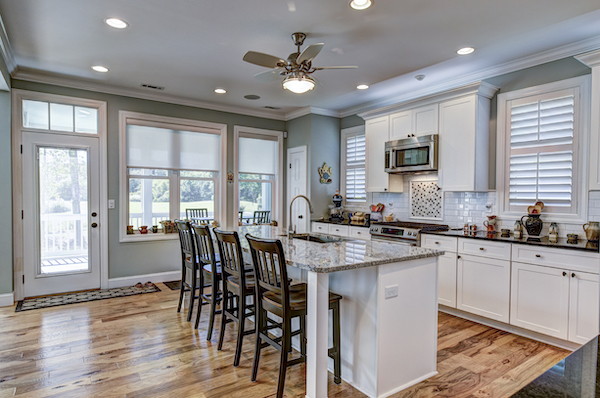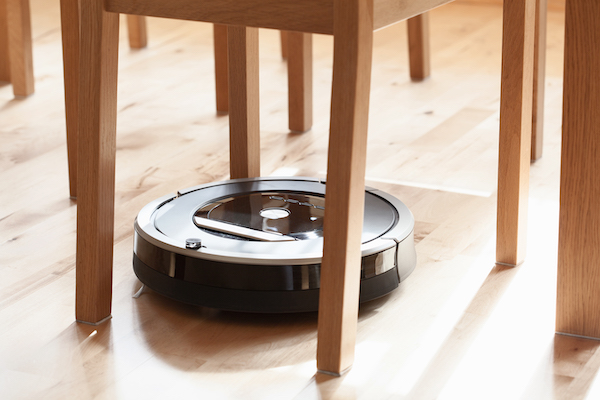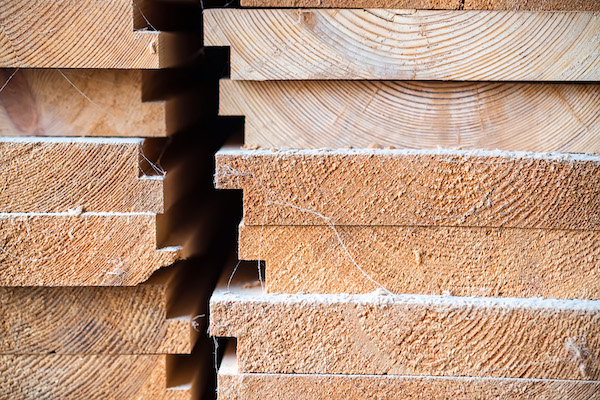What You Need to Know About Hardwood Floors in Kitchens
- Published By: District Floor Depot

The Pros and Cons of Installing Hardwood Floors in Your Kitchen
The kitchen is one of the most important – and popular – rooms in your house. It’s where you cook, where you eat, where you host. You go there first thing in the morning for breakfast and probably end up there late at night for a snack.
A room as important as that needs the best floor possible. After all, you’ll spend a lot of time standing on top of it.
The trick is to find a floor that will withstand everything that goes on in the kitchen.
Will hardwood be that floor? Here are the pros and cons of installing hardwood floors in your kitchen.
The Pros:
There is a lot of upside to installing hardwood floors in your kitchen. Here are just a few of the benefits.
Warmth and Comfort

One of the top contenders for kitchen flooring is tile. However, hardwood flooring is both warmer and more comfortable.
This should be a significant consideration, given how much time you’ll probably spend standing in your kitchen.
For people who love to cook, especially early in the morning, it can make a noticeable difference.
Increases Home Value
Maybe you’re remodeling your home to sell it. Or you’re planning to retire in the next ten or so years and plan to move when you do. Perhaps you’re just open to the idea if the opportunity ever comes up.
Hardwood floors can increase the value of a property by 2.5%. Considering the kitchen is one of the rooms in a house that adds the most value, updating it with hardwood floors can mean a substantial return on investment.
Versatility
No matter the design style of your home, hardwood flooring can easily fit in. Because of the numerous stains, grains, and styles, you’ll have no issue finding something to complement your style.
Hardwood floors also add a lot of personality. In addition to the options you have with the type of wood you pick, you also have a variety of patterns to choose from.
Straight, random, diagonal, parquet, herringbone. These are all different types of floor patterns, and you can go with the one that fits your home’s personality best.
Easy to Clean

Hardwood flooring offers one of the easiest to clean options out there. Because it’s flat and visible, you’re able to clearly see (and clean) any crumbs, dirt, or spills – which is crucial for a room as mess-prone as the kitchen.
A Good Investment
Hardwood floors, if installed and maintained correctly, can last for at least twenty-five years, if not longer. Some homes were built over a hundred years ago and still have their original hardwood floors.
You don’t have to replace hardwood floors when there is wear and tear. Instead, you just refinish them every 7-10 years. The thicker your wood, the more you can refinish them. Some can be refinished as many as ten times, meaning your floors will probably outlast you.
Durability
Let’s face it. You drop things every now and then. We all do.

Hardwood floors are durable enough to handle it. They’re fairly resistant to scratches and dents and will survive your clumsiest moments.
Just look at the warranty for hardwood flooring! It tends to be longer because companies are confident that their product will outlast the warranty.
Beauty
Perhaps the most obvious of all, hardwood floors offer a timeless beauty that can tie the look of your home together.
The Cons:
Of course, nothing is perfect, and hardwood floors are no exception. Here are the cons associated with installing them into your kitchen.
High-Traffic Area
Your kitchen is a high traffic area. Your family continually treks through here for food and drinks. Or they just to stare into the fridge as a way to pass the time.
Eventually, this constant pattern of travel can wear trails into your hardwood flooring, and they may be noticeable enough to drive you crazy.
When this happens, you’ll have to refinish your floors to get rid of the wear and tear.
Susceptible to Water Damage
Hardwood floors have become more and more popular, but you’ll seldom see them in the bathroom because hardwood floors are at risk of warping and tearing from water damage.

Your kitchen isn’t nearly as saturated with water as your bathroom is, but it certainly isn’t as dry as your living room either.
It actually falls somewhere in the middle of those two extremes.
Your kitchen isn’t nearly as saturated with water as your bathroom is, but it certainly isn’t as dry as your living room either. It actually falls somewhere in the middle of those two extremes.
Spills won’t damage your flooring as long as they’re wiped up quickly. Standing water, however, can have an effect. Leaks in your refrigerator’s filtration system, dishwasher, and sink can all wreak havoc if they’re not taken care of properly.
If this happens, you may find yourself replacing your wooden floors much sooner than anticipated.
Requires Maintenance
We mentioned how wooden flooring can be refinished instead of being replaced. This is a necessary part of the maintenance involved in keeping up the appearance of your floors.

They also must be kept clean to prevent scratching. You’ll want to sweep and mop regularly. Using a wet mop isn’t the best idea for hardwood floors, as the water can sink into the gaps. Instead, you should use a damp mop to prevent standing water and wipe away any excess when you’re done.
Tips for Choosing and Maintaining Hardwood Floors:
If you’ve decided that hardwood flooring is right for you, here are some tips and tricks to increase the longevity of hardwood floors in your kitchen.
- Choose wood with a high Janka Hardness rating. These woods are less vulnerable to dents and scratches.
- Go with a textured design. This will mask any eventual dents and scratches and delay the need for refinishing.
- Consider site-finishing your hardwood floors. This will seal the gaps between the planks in your floors and reduce the amount of water your floor absorbs.
- Place throw rugs down by the refrigerator, dishwasher, sink, and stove. These areas are the most susceptible to spills and leaks, and rugs can help protect against damage.
- Clean up spills almost as soon as they happen to ensure the longevity of your hardwood floors.
- Hire a professional. Not only will they ensure that your floors are installed correctly, but they will also help you to pick the right type of wood and pattern to maximize the lifespan of flooring in your home.
If you have any more questions or you’re just ready to get started, contact us to learn more.
